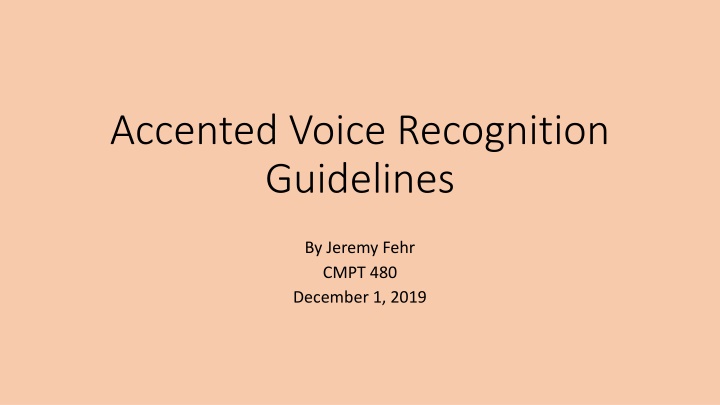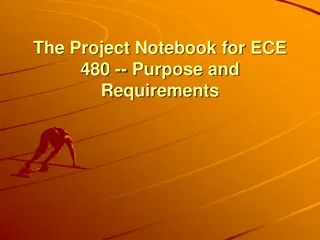
Enhancing Automated Speech Recognition for Diverse Accents
Explore the challenges faced in automated speech recognition due to diverse accents and the research efforts to improve recognition accuracy. Topics addressed include the limitations in accommodating specific accents, the role of linguistics in simplifying the problem, and the implementation of guidelines based on universal principles of spoken language. Discover the results of creating universally distinct words and the importance of linguistic theory in evaluating these outcomes.
Download Presentation

Please find below an Image/Link to download the presentation.
The content on the website is provided AS IS for your information and personal use only. It may not be sold, licensed, or shared on other websites without obtaining consent from the author. If you encounter any issues during the download, it is possible that the publisher has removed the file from their server.
You are allowed to download the files provided on this website for personal or commercial use, subject to the condition that they are used lawfully. All files are the property of their respective owners.
The content on the website is provided AS IS for your information and personal use only. It may not be sold, licensed, or shared on other websites without obtaining consent from the author.
E N D
Presentation Transcript
Accented Voice Recognition Guidelines By Jeremy Fehr CMPT 480 December 1, 2019
Justification Long-standing problems with accents for automated speech recognition. Most research goes toward accommodating specific accents; there is no broad solution. Accents are constantly evolving. Forces users to adopt a new accent.
Algorithmic Analysis New advances are using machine learning to improve specific accents. Interpreting natural language is incredibly complex. Accommodating many accents isn t currently feasible. Michael Tjalve s from University College London s PHD thesis outlined many of the challenges.
Linguistic Analysis Most researches aren t considering linguistics as part of their research. Considering linguistics can simplify the problem. Peter Ladefoged researched universal qualities behind many of the world s languages.
Implementation Researched various solutions for specific accents in speech recognition systems. Difficult to distinguish between general and specific solutions. A lot of very technical and advanced research. No system to test my guidelines.
Implementation Convert universal principles of spoken language into guidelines for speech recognition systems. Used references from the Linguistics Department. These were the most useful. Heavily referenced the fields of Phonetics and Phonology.
Results 20 guidelines were written under 4 categories: 1. Universally distinct words 2. Ease of pronunciation 3. User comprehension 4. System characteristics
Results: Universally Distinct Words The largest category of guidelines. Uses sounds that are stable across accents. Difficult to evaluate the results. Advanced algorithms would be needed to measure the similarity between words. Linguistic theory was used to evaluate these results.
IPA Vowel Chart (alt slide) 28 vowels are sorted within an inverted trapezoid shape. Columns are sorted by front, central, and back; and rows are sorted by close, close- mid, open-mid, and open.
Results: Ease of Pronunciation Guidelines give advice on avoiding difficult English words. Identifies sounds and words that more people around the world are likely to easily produce. Results don t deviate far from well documented research.
Results: User Comprehension Some English words have different meanings around the world. Avoids regional variants. Aims for simple English . Needs more thorough research. Simplicity is somewhat relative.
Results: System Characteristics Guidelines to specifically benefit the speech recognition system. These will benefit users indirectly. More easily evaluated by computer science standards.
Conclusion More practical evaluation is needed. It is too theoretical. Worth pursuing for someone in the field of computational linguistics. This is a unique approach to improving accented voice recognition.







